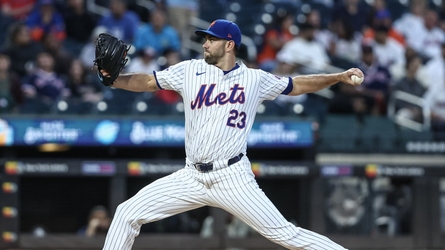As the Mets fight for a playoff spot down the stretch of a season that feels like the start of something big — no matter how it ends — Sean Manaea and David Peterson have turned into a pair of aces.
Over his last seven starts, even with an uneven one against the Mariners in Seattle thrown in, Manaea has a 2.42 ERA in 44.2 innings. He has allowed just 26 hits and has held opposing batters to a .164/.218/.283 slash line.
During that span, Manaea has completed 7.0 innings five times, and pitched 6.2 innings in one of his other starts.
As far as Peterson? His dominance goes back to July 1.
In 71.1 innings over 12 starts since then, Peterson has a 2.40 ERA.
But if you drill down on his last four starts, the big lefty has taken it up another notch.
In 27.1 innings, Peterson has a 1.98 ERA, has held hitters to a .238/.280/.327 triple slash, and has completed seven innings three times.
On Tuesday night against the Red Sox at Citi Field — pitching on his birthday — the 29-year-old limited Boston to one run in 6.0 innings while racking up a career-high 11 strikeouts.
We led this article with both Manaea and Peterson because while the Mets future of one of them (Manaea) is very much up in the air, the Mets future of the other (Peterson) is not.
After parts of four seasons where Peterson showed flashes, including a solid 2022 campaign, Peterson has stopped nibbling. He looks in control. It feels like he’s arrived.
And with Peterson’s emergence, the Mets should feel confident that they have one big piece of a tricky 2025 starting rotation puzzle.
To break it down…
Manaea has a $13.5 million player option for 2025 that he will almost certainly turn down, making him a free agent. The Mets should try hard to retain him, but it remains to be seen what his future holds.
Luis Severino, who has tossed 159.1 innings during a terrific bounce back season, is also set for free agency.
Jose Quintana, who has had pockets of struggles this season amid a year that has been solid overall, is — you guessed it — a pending free agent.
Kodai Senga is under contract for next season, but will be coming off a campaign where he made either one start or — if he returns during the last week of the season and the Mets make the playoffs — anywhere from two to seven starts.
Then there’s Christian Scott, whose recovery from a UCL injury is going well, but whose availability for the end of this season and next season remains up in the air.
Paul Blackburn, who was acquired at the trade deadline, is arbitration-eligible and a strong bet to be brought back. But he has never pitched more than 112 innings in a season.
That means that the Mets’ rotation heading into the offseason could look something like this:
Kodai Senga
David Peterson
Christian Scott?
Paul Blackburn?
???
That’s why Peterson, who is arbitration-eligible in both 2025 and 2026, could be such an important pitcher for the Mets over the next two seasons.
Yes, Senga could be healthy and terrific in 2025. But will his innings be limited?
And what about Scott, who could still face Tommy John surgery if his UCL doesn’t cooperate?
Beyond the aforementioned pitchers, there are intriguing arms in the pipeline, including Brandon Sproat and Blade Tidwell, who are both with Triple-A Syracuse. But it’s unlikely that either is an option from the outset next season.
The Mets will also very likely dip into free agency for rotation help this offseason, but will they go for someone like Corbin Burnes (who reportedly wants eight years and whose peripherals have been slipping)? Logic says that would be a dangerous move.
As far as Peterson, there will continue to be questions about his results even amid his dominance. One of those queries was posed to president of baseball operations David Stearns during Tuesday’s media availability.
The question went something like this: how do you square up Peterson’s actual results this season (really good) with his expected results (middling).
Stearns’ answer was thoughtful, with him noting that Peterson induces lots of weak contact and alluding to the fact that the left-hander has been pitching with confidence this season.
Yes, Peterson will allow his share of runners to reach base — as evidenced by his 1.31 WHIP this season and his career WHIP of 1.38.
But if Peterson is attacking hitters confidently with his fastball up in the zone and his wipeout slider, while mixing in his sinker liberally and inducing the weak contact Stearns discussed, he should continue to excel.
It should also be noted that his advanced numbers aren’t all middling.
His ground ball rate this season has been elite (in the 90th percentile), and his extension is in the 95th percentile, meaning he’s releasing the ball closer to home plate than most pitchers in baseball — resulting in his stuff seeming more explosive to the hitters.
But no matter how you slice it, Peterson’s emergence has been huge for the 2024 Mets, and could be incredibly important for them going forward.
Read the full article here


























